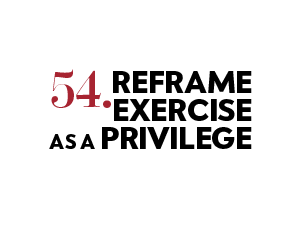
This January, in honor of my 44th birthday, I resolved to fix, change, organize, replace or otherwise deal with anything that had been driving me bonkers.
This is what the late Thomas J. Leonard (widely considered the father of life coaching) referred to as “eliminating tolerations.” And let me tell you, when it comes to life-changing revolutionary acts, this practice is a doozie.
I consider tackling tolerations a revolutionary act because at any given time, most of us are putting up with hundreds of these energy-drainers — everything from niggling little distractions to sources of frustration so oppressive and so entrenched that we’ve become practically inured to them.
Lugging the burden of our tolerations everywhere we go affects our attitude, our self-perception, the way we interact, our physical well-being — practically everything.
That’s why I included No. 77, “Eliminate Annoyances,” in the “101 Revolutionary Ways to Be Healthy” atRevolutionaryAct.com.” Irritations aren’t just crazy-making; the stress they produce also leads to inflammation, and inflammation leads to illness and misery.
The tricky thing about tolerations, though, is that they tend to accumulate over time. Gradually, insidiously, like a slew of tiny leeches clinging to your backside, they suck away at your lifeblood — or, at the very least, your pleasure in living.
Still, as Leonard noted, tolerations aren’t all bad. Often, they have a lot to teach us. If handled properly, they can act as “a grain of sand in your oyster” — the kind that creates a pearl.
Indeed, the irritations that tolerations produce eventually become so maddening that they trigger us to face our areas of challenge or unconsciousness, to create positive change, and thus, to grow. We can achieve this if we pause to notice how a particular toleration got there in the first place and why we’ve been agreeing to endure it until now.
Tolerations can include people, places, things, situations, feelings — just about anything. Once you start looking, you will probably find them everywhere. And I promise you, if you first carefully explore and then uproot a single toleration, you’ll get excited about the possibility of eliminating many more.
So, back to my list. About a week before my birthday, I began jotting down my tolerations as they occurred to me — mostly small, niggling annoyances. They included, among other things:
- Broken coffee grinder
- Slow kitchen faucet
- Dried up pens
- Clutter pile on counter
- Cordless phones that say, “Reconnect to Base,” and then go dead when you answer them
Seeing as the broken coffee grinder was something I was having to deal with first thing every day (prior to my first cup of coffee), I decided to tackle it straight away.
The switch on that grinder had been broken for a long time — since I’d dropped it and broken off a tiny plastic part that, when depressed, turned the grinder on. Because the grinder worked fine otherwise, I couldn’t justify tossing it, so for more than five years, I’d been using the sharp end of a chopstick to depress the little mechanism while holding the cap on.
Of course, this clever maneuver involved finding said chopstick, which was usually in one of three spots — depending on whether it was my husband or me who had made the coffee the previous morning and depending on who had cleaned up (or not) afterward.
If the prior day’s coffee duty had fallen to me, the chopstick would most likely be in the urn that holds frequently used utensils. If it had fallen to my husband, the chopstick might be in the urn — or it might be in the drawer. Anywhere in the drawer. Then again, if neither one of us had cleaned up, the chopstick might still be sitting on the counter, in which case it might also have rolled out of sight somewhere on the surface. And thus, chances were good as not that on a given morning, the making of coffee would involve a groping, clattering, bleary-eyed chopstick hunt.
I tell you all this because it illustrates something characteristic about tolerations: One small vexation very often leads to a bigger vexation, so that a whole series of tolerations wind up nested or linked in some way.
And so it would happen that before I’d even managed to make coffee each morning, I’d typically encountered a cluster of minor annoyances — with the grinder, the chopstick, myself, my husband or all of the above — annoyances that ever so slightly dampened my mood, and ever so slightly increased the chances of my feeling inadvertently exasperated with my otherwise wonderful life.
So, why had I tolerated that busted grinder for five long years, and why did I not get around to replacing it until a few weeks ago? Well, initially I thought it was the right and low-impact thing to do. After all, it was just a tiny bit of plastic that had broken off; the rest of the grinder was perfectly good, so I didn’t want to send it to the landfill and then run to the store to purchase another one if I didn’t have to.
And interestingly, while I was living alone (until I got married a couple of years ago), the whole ritual with the chopstick hadn’t bothered me; in fact, it gave me a virtuous feeling of thrift, eco-friendliness and ingenuity. I always knew where the chopstick would be, and so it wasn’t a toleration, it was just a puttering little Zen practice.
Which is another interesting thing about tolerations: Whether or not they qualify as tolerations is all in how you perceive and react to them. And that, of course, is largely up to you.
When I investigated my coffee-grinder toleration, for example, I had a whole slew of interesting insights — about the nature of my adjustment to co-habitation, about the tension my eco-friendly values and my convenience-seeking priorities, about my tendency to argue with reality (Thank you, Byron Katie) and so on.
This process of self-inquiry is an essential component of the toleration-elimination process. Unless you perceive the growth opportunities it represents for you, the tolerations you’re banishing tend to return with a vengeance.
So I did some personal exploration. I had some big insights. And then, with a peaceful heart, I replaced the grinder.
The best part? I didn’t have to toss the old one after all. It’s been dedicated to grinding flax and sesame seeds (which I do only occasionally), so now every time I reach for the chopstick, I have an opportunity to reflect with gratitude on how happy I am not to need it every morning.
Having similarly dispatched the rest of my tolerations list (I had some broken stuff repaired, established a clutter-reduction system for the kitchen counter and so on), I must say, the result has been a series of revelations. My mornings have been transformed, and my mood and energy are much improved.
So, what’s on your tolerations list? What are you energized to tackle first? How long have you been tolerating these things, and with what effect? And what insights might your tolerations have to impart before they go?
If you want to read a little deeper on the subject, check out “Tolerate Less,” an article we featured inExperience Life magazine a while back. Or, read Thomas J. Leonard’s terrific book, “The Portable Coach: 28 Surefire Strategies for Business and Personal Success (Scribner, 1998).”
In the meantime, happy toleration-tackling, and may you do wonderful, gratifying things with the energy you reclaim!
Pilar Gerasimo is the Editor in Chief of Experience Life magazine.




